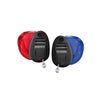 Listening Lab Malaysia has a selection of Signia hearing aids. Check it out!
Listening Lab Malaysia has a selection of Signia hearing aids. Check it out!

There are many types of hearing aids to choose from. A few of the many designs of hearing aids include completely-in-the-canal, behind-the-ear, and invisible-in-canal. How do you know which one you should get? There are many factors to consider on what type you should get for yourself. If you’re considering getting yourself a small hearing aid, you better check this out first. We’ve listed the advantages and disadvantages of them.
What are small hearing aids?
Before we dive into the advantages and disadvantages of small hearing devices, one must know what they are first. Basically, we can say that completely-in-the-canal and invisible-in-the-canal hearing aids are small. They can be cleverly hidden from most people and is just worn discreetly.
Advantages
1. They are invisible or discreetSmall hearing aids are really great for people who have hearing loss but don’t want to appear that they’re wearing a device. They are discreetly and cleverly placed in parts of your ear that aren’t easily seen by others.
2. They are custom fitted just for youSince these devices are to be placed inside your ear canal and every ear differs from another, small hearing aids are customized to your fitting. With that, you are guaranteed that they’ll be comfortable.
3. They allow you to use other devicesSince the devices are placed in such a manner that it doesn’t block or interfere with other devices such as telephones and headsets, you will be able to use them. There’s no dangling part of the hearing aid that would make it a challenge for you to use it.
4. They have their own protectionOne difference from devices that aren’t placed inside the ear canal from those that are is that internal devices have the outer ear protecting them. It is less likely to get dropped when pushed against or bumped into and it is less likely that it would pick up wind noise that could affect your hearing.
5. They use less powerThese devices are much nearer to the eardrums and it is because of this that they use less power in transmitting sound. They are also less likely to experience hearing feedback from them as well.
Disadvantages
1, They don’t work for more advanced and severe casesNot because you are given the option of wearing a small hearing aid, doesn’t mean that you should. Small hearing aids work best for those who have only mild to moderate cases of hearing loss. If it’s more severe than that, your doctor might suggest you wear a different style of hearing aids.
2. They are a bit difficult to handleIf you’re someone who has dexterity problems, then maybe small hearing aids isn’t for you. Since they are smaller, they would be harder to use. Replacing the battery is also more difficult.
3. They might have limited featuresSmall devices come with a price. Meaning, if you want to use an almost hidden hearing aid, you would have to give up some features that regular sized ones have. One feature is the directional microphone which can be very useful in many environments. Try to consider first your lifestyle and the type of environment you spend most of your time in.
4. They are not for everyoneThe sad thing about small hearing aids is that they don’t fit in everyone’s ear canal. You may not be a candidate for that style of hearing aid. That is why it is recommended that you get a hearing aid fitting before anything else.
5. They’re not suited for those with ski slope hearing lossYou might be wondering what ski slope hearing loss is. Well, image a ski slope that is curved like a big hump. This curve is also what high frequency sounds look like on an audiogram. It is considered to be a special kind of sensorineural hearing loss. Not sure if you have ski slope hearing loss? You may consult with a hearing care professional at Listening Lab to know if you have this condition.
Now that you’ve read the advantages and disadvantages of small hearing aids, do you think you’ll be getting one? Always consult with your ear doctor before you make a decision. Let the hearing care professionals at Listening Lab assist you in making that decision. Drop us a line at +65 6817 5100.











